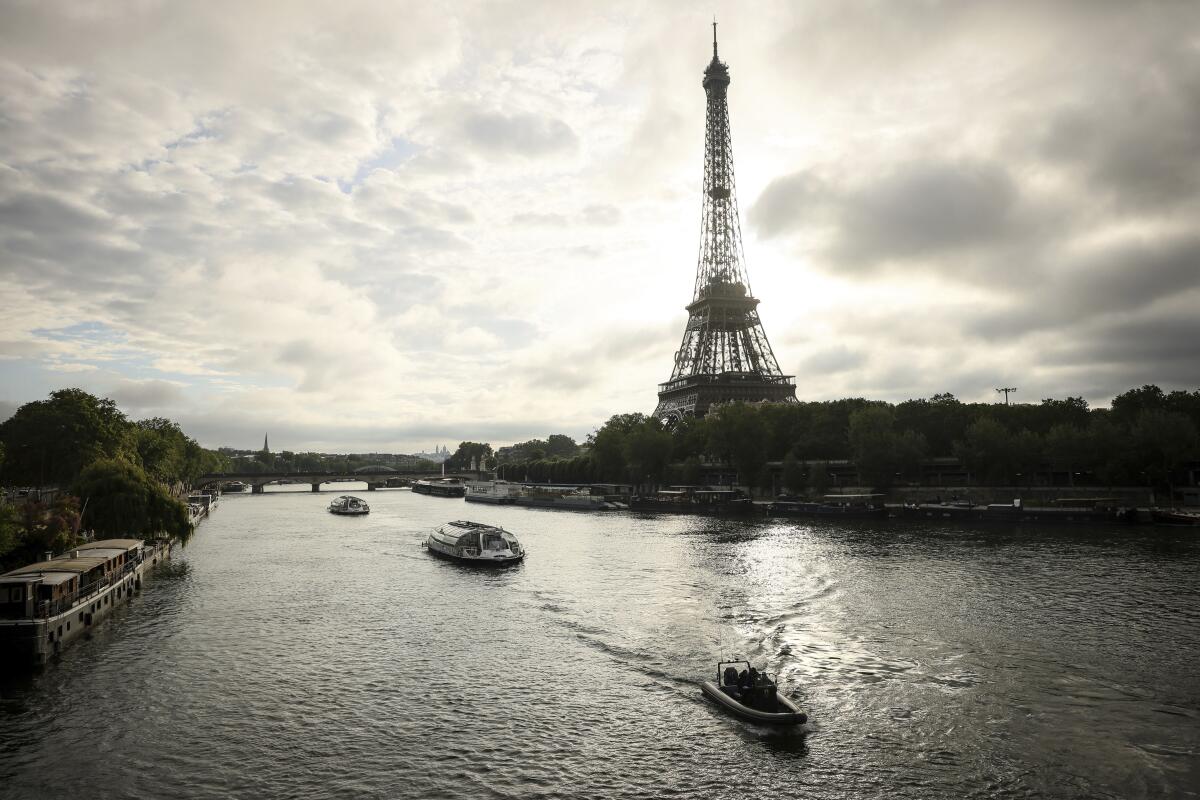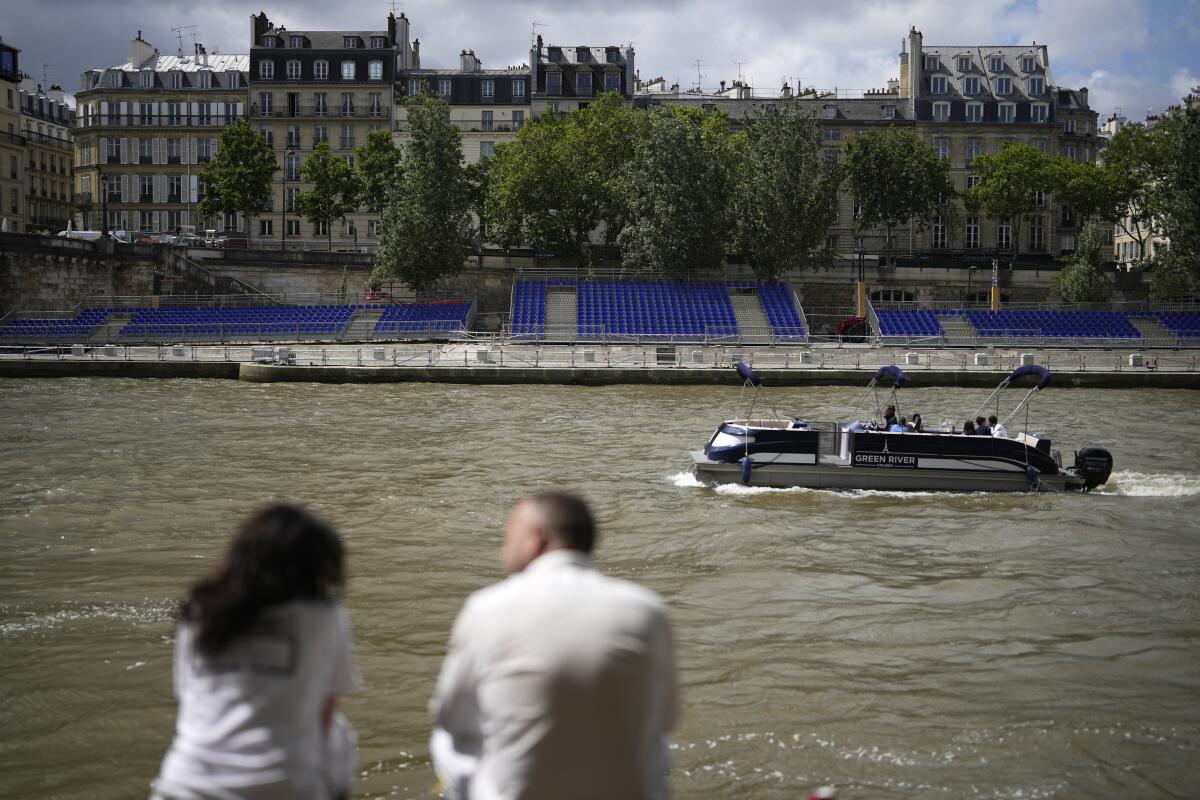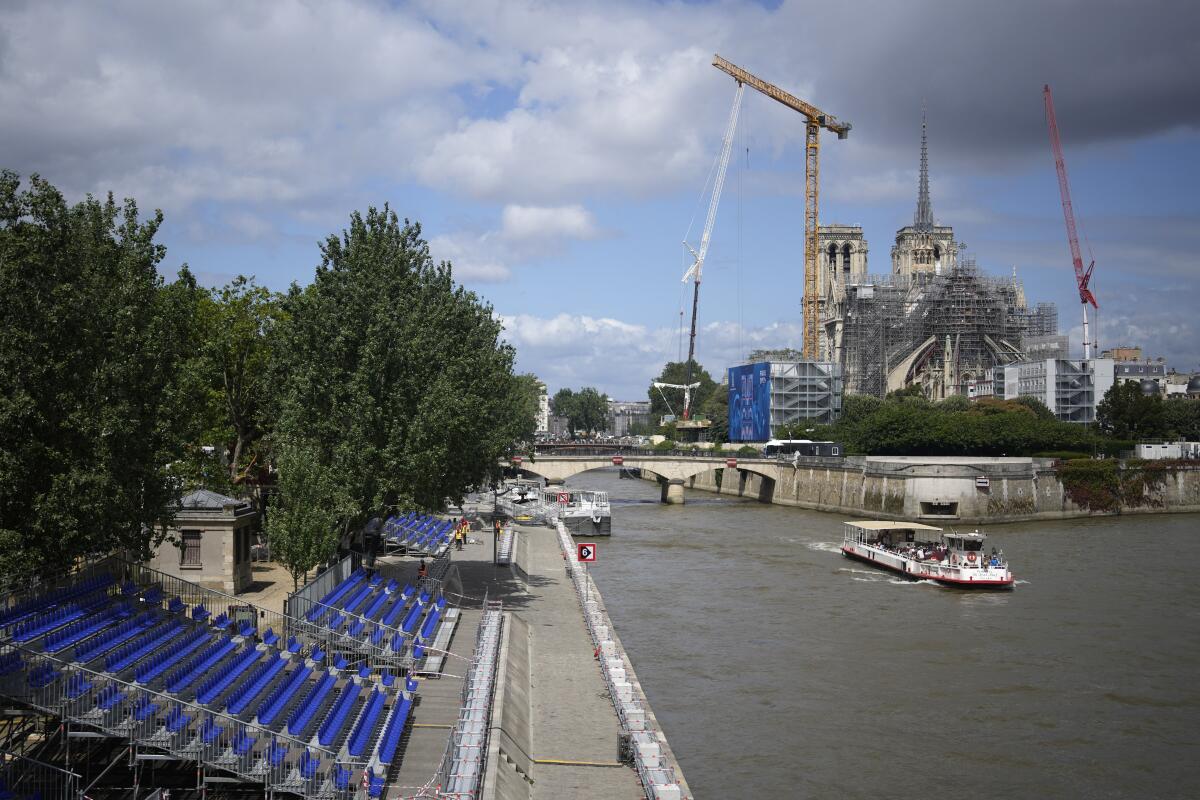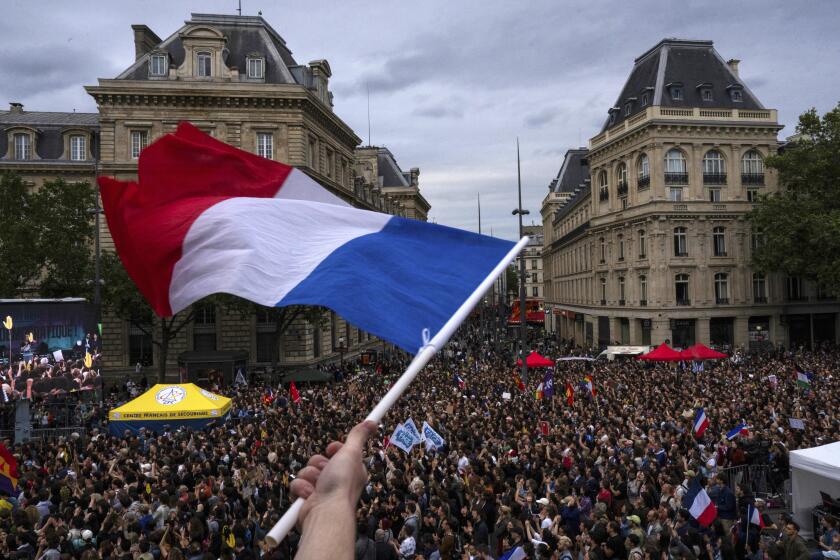Romantic, sure. Historic, yes. But is the River Seine safe for Olympic swimming?

- Share via
PARIS — Some people laugh outright. Others raise their eyebrows or grimace. On the stone quays of the Seine, even the most passionate odes to the river’s charms tend to arrive at the same conclusion: Nope.
“Swim in it? Me?” said retiree Patrice Desrousses, 64, recoiling ever so slightly as he paused in his promenade beside the storied waterway. “Oh, I think not.”
For the record:
12:20 p.m. July 17, 2024An earlier version of this story stated that Georges-Eugene Haussmann was Napoleon’s prefect of the Seine. Napoleon III was actually Haussmann’s prefect of the Seine.
Less than two weeks before Paris inaugurates its first Olympic Games in a century, the Seine — watery muse to poets and painters, backdrop to the city’s most majestic monuments, sighed over by generations of lovers — remains the designated open-air venue for marathon and triathlon swimming events during the global sports festival.
Whether that will actually happen, though, is anyone’s guess.
Recent water-quality tests have shown steady improvement, and if current trends hold, the river may be deemed safe for swimming. But readings earlier this summer turned up high levels of E. coli bacteria, which indicates the presence of fecal matter.
France’s voters denied the far right an expected election victory. But neither the left nor the center won an absolute majority. Deadlock will likely follow.
Despite an expensive and ambitious antipollution initiative, officials acknowledge that a single drenching downpour at an inopportune moment could send a surge of sewage into the waterway.
For visitors and locals alike, ongoing drama over whether the Seine will be swimmable has become its own spectator sport.

“Our dream was to bathe in the river like Parisians used to do 100 years ago,” the city’s mayor, Anne Hidalgo, said in May at the opening of a huge stormwater cistern near to the Austerlitz train station, one of half a dozen major infrastructure projects in a $1.5-billion drive to clean up the river.
Hidalgo has promised to swim in the Seine this week as a show of confidence in its Olympic readiness, although she bowed out of a June pledge to do so. France’s sports minister, Amelie Oudea-Castera, took a plunge this month, although some onlookers noted that she didn’t stay in the water for very long.
French President Emmanuel Macron — fresh off a contentious election in which his centrists and a left-wing grouping staved off a challenge from the far right, but ended up in a parliamentary deadlock — vowed months ago to swim in the river before the Olympics, but then, joking or not, told journalists he wouldn’t say when, because then they’d show up to watch.
Further discouraging high-profile plans to take a dip, online activists, unleashing an abundance of scatological puns, threatened last month to defecate in the river en masse as an expression of frustration with politicians over pressing social issues.
While meteorologists say the forecast between now and the start of the Games is for hot and sunny weather that will help keep waterborne bacteria levels down, the Olympic organizing committee has confirmed there are backup plans in place if the Seine is deemed unsuitable for competitive swimming — which, as many commentators have noted, involves concerted open-mouthed gasping for air.
Fallbacks include postponing events now set to take place between July 30 and Aug. 5; changing the triathlon to a duathlon by dropping the swimming element; or relocating the marathon swimming event to a nautical stadium about an hour and a half’s drive away in Vaires-sur-Marne, which is already set to host rowing and canoe competitions.
The Lakers star is leading a contingent of America’s best basketball talent possibly ever assembled to claim what might be the last championship he’ll win.
By design, talk about backup plans has been muted, with near-daily expressions of positivity from organizers. But official optimism is often at odds with the opinions of passersby.
“So beautiful! So romantic! And so dirty!” said jogger Jeff Sanchez, 54, pausing near the lavishly ornate Alexandre III bridge, which overlooks one of the competition venues. He predicted that contingency plans would need to be activated rather than risking swimmers’ health.
A lanky young skateboarder, who did not want to give his name, grinned and shook himself all over, like a dog after a bath, when asked if he thought Olympic swimmers would be able to take to the Seine.
For more than a century, swimming in the river has been prohibited — although, as Sorbonne University environmental historian Laurence Lestel told the BBC this year, the ban was originally put in place because of navigational hazards, not pollution. But the river then was dirty indeed: At Paris’ 1900 Olympics, she said, swimming events took place “just upstream of a sewage discharge point.”
From the Middle Ages on, Paris’ early underground waste channels were a wellspring of public fascination — and a source of pestilence, criminality and existential dread.

In the mid-1800s, Georges-Eugene Haussmann — Napoleon III’s prefect of the Seine — helped usher in the city’s modern sewer system as part of an immense redevelopment effort that saw the leveling of thousands of old structures to make way for Paris’ trademark sweep of broad boulevards.
“The sewer is the conscience of the city,” wrote the poet and novelist Victor Hugo, of Les Misérables fame. “Everything there converges and confronts everything else.”
Much of that 19th century system survives, in updated form — and its vulnerability to inundation has been only partly countered by the pre-Olympics cleanup binge.
In the cool, echoing caverns of Paris’ below-ground Museum of Sewers — where familiar blue street signs in the tunnels precisely mirror those above — the voice-over to a video extolling high-tech improvements regretfully informs visitors that under certain circumstances, raw sewage still sometimes finds its way into the Seine.
Political upheaval and other issues plaguing Paris ahead of the start of the Summer Olympics threaten to dwarf whatever is floating in the Seine.
Visitors were diplomatic about how clean the river might be for the Games.
“Well, they’re clearly trying very hard,” said Canadian commercial pilot Brian Beare, 47, touring the museum’s stone-lined passages in early July with his wife and two young sons. “But you do see these kinds of runoff issues in any big city, like with Toronto and Lake Ontario. You just have to keep working at it.”
In the meantime, an elaborate web of grandstands and scaffolding is going up on the riverbanks in preparation for the opening ceremony — a grand east-to-west boat parade through central Paris.
Day and night bring a babel of languages to the city’s bridges. The wide wakes of tourist boats slap at the quays. Visitors browse the riverside bouquinistes, the dark-green bookseller stalls that Macron personally ensured would stay in place during the Olympics despite security worries.
As dawn breaks and dusk settles, the play of light and shadow turns the river green or gunmetal gray, lustrously pearlescent or mottled brown.
“There’s so much that people are worried about these days — we hope the Olympics will be safe for all, including the swimmers,” said Marie-Helene Marin, a sixtyish shop assistant and lifelong Parisienne who was walking her wrinkly-faced pug a few blocks from the river. “But when all this is over, whatever happens, it will still be our Seine.”
More to Read
Sign up for Essential California
The most important California stories and recommendations in your inbox every morning.
You may occasionally receive promotional content from the Los Angeles Times.













